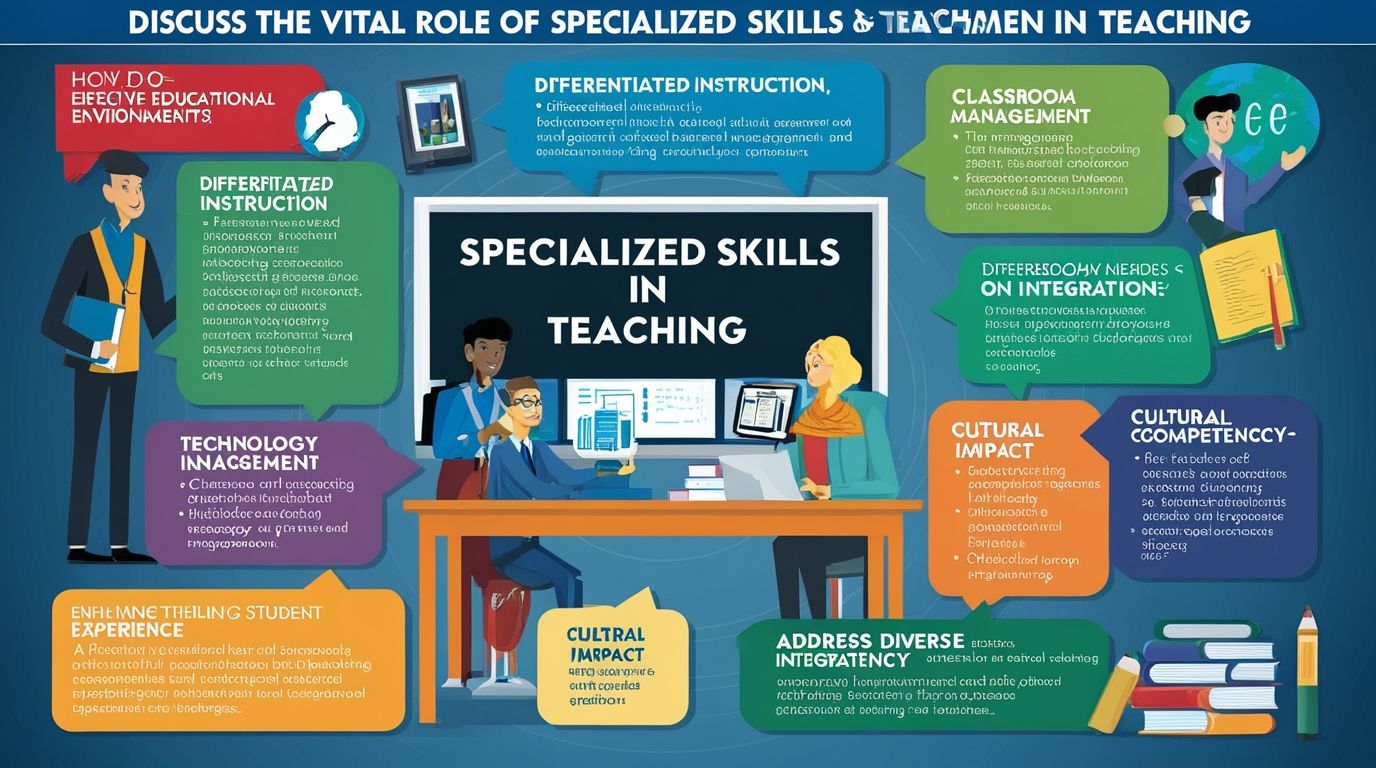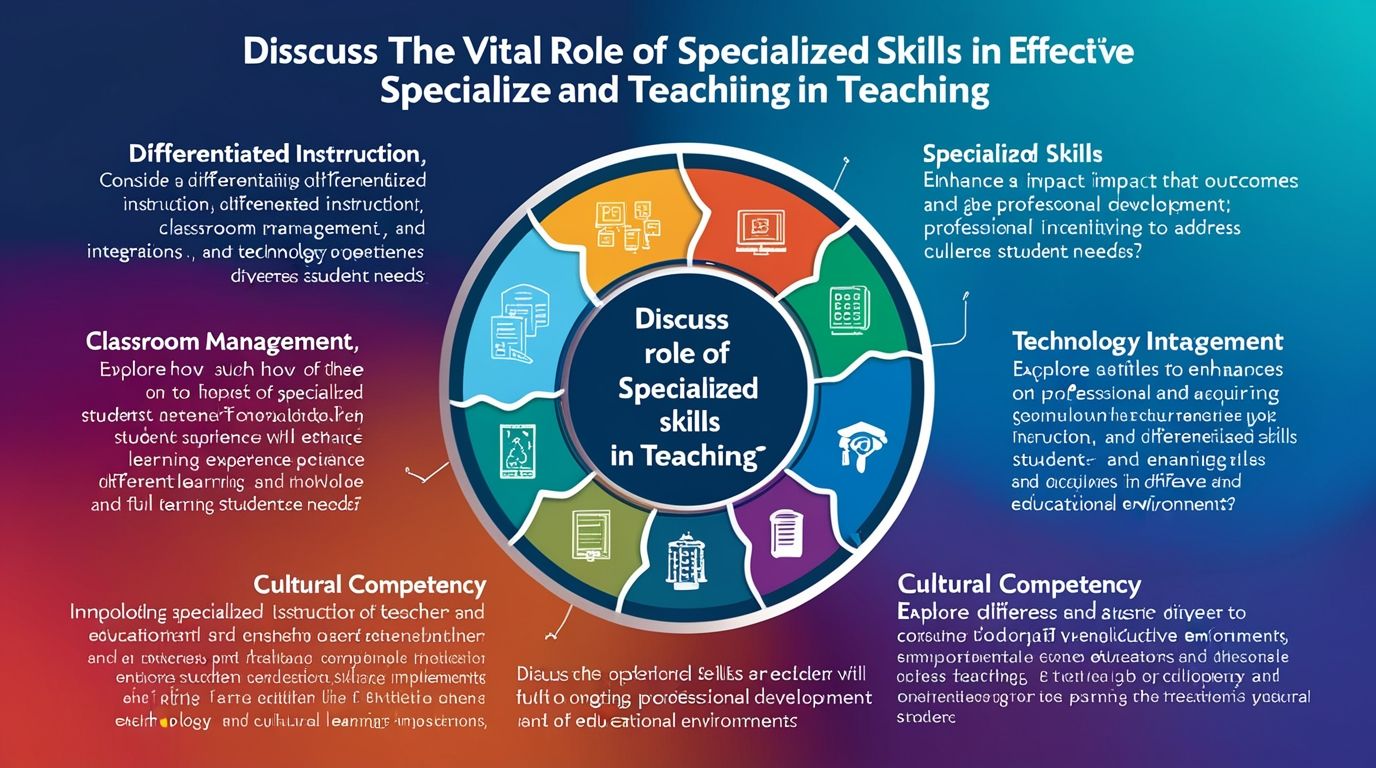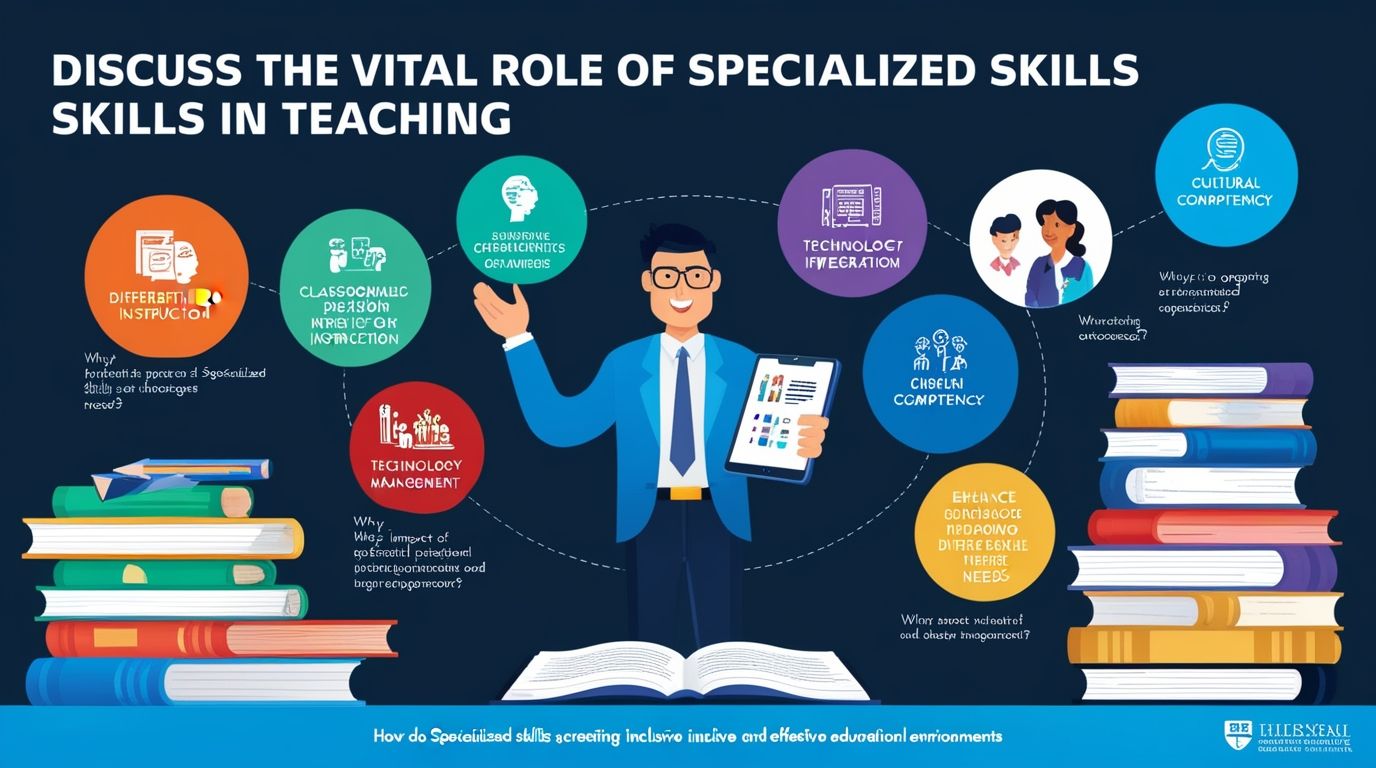The Vital Role of Specialized Skills in Teaching In the modern educational landscape, specialized skills in teaching have become increasingly significant. These skills extend beyond basic instructional methods, encompassing a range of competencies that allow educators to effectively address diverse learning needs, integrate technology, and foster critical thinking. This article explores the importance of specialized skills in teaching, how they enhance educational outcomes, and why they are essential for educators in today’s dynamic classroom environments.
1. Understanding Specialized Skills in Teaching
Specialized skills in teaching refer to the advanced knowledge and techniques that educators use to improve the learning experience. These skills include, but not limited to:
- Differentiated Instruction: Tailoring teaching methods to accommodate various learning styles and abilities.
- Classroom Management: Implementing strategies to maintain a positive and productive learning environment.
- Technology Integration: Utilizing digital tools to enhance learning and engage students.
- Assessment and Evaluation: Designing and applying assessments that accurately measure student understanding and progress.
- Cultural Competency: Being aware of and responsive to the cultural backgrounds of students, promoting inclusivity.
- Emotional Intelligence: Understanding and managing one’s emotions and recognizing and influencing the emotions of others in the classroom.
Furthermore, these specialized skills enable teachers to move beyond traditional methods, creating a more personalized and effective educational experience.
2. The Impact of Specialized Skills on Student Learning
The development and application of specialized skills in teaching have a profound impact on student learning. When educators employ these skills, they can better address the diverse needs of their students, ensuring that each learner has the opportunity to succeed.
2.1 Differentiated Instruction Differentiated instruction is critical in addressing the diverse learning needs within a classroom. Students come with varying levels of prior knowledge, learning styles, and paces. A teacher equipped with the skills to differentiate their instruction can provide multiple pathways to learning, ensuring that all students, regardless of their starting point, can achieve the learning objectives. This approach not only improves academic performance but also boosts students’ confidence and motivation.
2.2 Classroom Management Effective classroom management another specialized skill that directly influences student outcomes. A well-managed classroom provides a safe and structured environment where students can focus on learning. Teachers skilled in classroom management can minimize disruptions, set clear expectations, and create an atmosphere of mutual respect. This not only facilitates learning but also helps in the development of students’ social and emotional skills.
The Impact of Specialized Skills on Student Learning
2.3 Technology Integration In today’s digital age, the integration of technology in the classroom is essential. Teachers with specialized skills in technology can leverage digital tools to enhance instruction, provide interactive learning experiences, and access a wealth of resources that can enrich the curriculum. Technology also allows for the personalization of learning, enabling students to work at their own pace and explore subjects that interest them. Furthermore, it prepares students for the technological demands of the modern workforce.
2.4 Assessment and Evaluation Accurate assessment and evaluation are fundamental to understanding student progress and guiding instruction. Teachers who are skilled in designing and interpreting assessments can provide meaningful feedback that helps students improve. These educators can also use assessment data to identify gaps in learning and adjust their teaching strategies accordingly. This results in a more targeted and effective approach to education, ensuring that all students are progressing toward their academic goals.

3. Specialized Skills and Teacher Professional Development
The acquisition of specialized skills is an ongoing process that requires continuous professional development. As educational needs and technologies evolve, so too must the skills of educators. Professional development opportunities, such as workshops, conferences, and advanced degree programs, are essential for teachers to stay current with best practices and emerging trends in education.
3.1 Lifelong Learning for Educators Teachers who engage in lifelong learning are better equipped to meet the challenges of modern education. By continuously updating their skills and knowledge, they can adapt to changes in curriculum standards, educational technologies, and student needs. This commitment to professional growth not only benefits the individual teacher but also enhances the overall quality of education within the institution.
3.2 Collaborative Learning Communities Collaborative learning communities, such as professional learning communities (PLCs), provide a platform for teachers to share expertise, discuss challenges, and develop new strategies for teaching. These communities foster a culture of continuous improvement and encourage the collective advancement of teaching skills. By working together, educators can build on each other’s strengths and develop innovative approaches to common teaching challenges.
4. The Role of Specialized Skills in Addressing Equity in Education
Specialized skills are also crucial in addressing equity in education. In many classrooms, students come from diverse cultural, linguistic, and socioeconomic backgrounds. Teachers with specialized skills, particularly in cultural competency and differentiated instruction, better prepared to meet the needs of these diverse learners.
4.1 Cultural Competency Cultural competency involves understanding and respecting the diverse backgrounds of students and using this knowledge to create an inclusive classroom environment. Teachers who possess cultural competency are able to connect with students on a deeper level, making learning more relevant and accessible. They can also address potential biases in the curriculum and create a learning environment where all students feel valued and supported.

5. Challenges in Developing and Implementing Specialized Skills
While the importance of specialized skills in teaching is clear, there are challenges in developing and implementing these skills. These challenges include:
- Time Constraints: Teachers often have limited time for professional development due to their demanding schedules.
- Access to Resources: Not all educators have access to the necessary resources or training to develop specialized skills.
- Institutional Support: The development of specialized skills requires support from school administrations in terms of funding, time, and encouragement.
- Resistance to Change: Some educators may be resistant to adopting new methods or technologies, preferring to stick with familiar approaches.
Addressing these challenges requires a concerted effort from educational institutions, policymakers, and educators themselves. Providing more opportunities for professional development, ensuring equitable access to resources, and fostering a culture of innovation within schools are critical steps in overcoming these obstacles.
6. Conclusion
In conclusion, specialized skills in teaching are vital for the success of both educators and students in the modern educational landscape. These skills enable teachers to create engaging, inclusive, and effective learning environments that cater to the diverse needs of their students. As education continues to evolve, the demand for specialized skills will only increase, making continuous professional development and institutional support essential. By investing in the development of these skills, we can ensure that educators are well-prepared to meet the challenges of the 21st-century classroom and provide all students with the opportunity to succeed.
Additionally, this article highlights the importance of specialized skills in teaching and emphasizes the need for ongoing professional development to ensure that educators are equipped to meet the diverse needs of their students. It also addresses the challenges that teachers face in acquiring and implementing these skills, offering insights into how these challenges can be overcome.

I’m impressed, I must say. Actually not often do I encounter a weblog that’s both educative and entertaining, and let me let you know, you might have hit the nail on the head. Your idea is outstanding; the problem is one thing that not sufficient people are talking intelligently about. I am very glad that I stumbled throughout this in my seek for something regarding this.
I really appreciate this post. I’ve been looking everywhere for this! Thank goodness I found it on Bing. You have made my day! Thank you again
I’ve recently started a site, the info you offer on this website has helped me greatly. Thanks for all of your time & work.
b5uqz3
l8f71e
Can I just say what a relief to find someone who actually knows what theyre talking about on the internet. You definitely know how to bring an issue to light and make it important. More people need to read this and understand this side of the story. I cant believe youre not more popular because you definitely have the gift.
mistu8
Wake up your way with this premium CD player alarm clock radio. Whether you prefer to rise with the AM/FM radio, your favorite CD, or a standard buzzer, this versatile alarm clock with CD player has you covered. Its intuitive design includes dual alarms, a large digital display, snooze/sleep timers, and USB charging for your phone. Enjoy high-quality stereo sound from a compact unit that fits easily on any bedside table or shelf. The best clock radios with CD player combine retro functionality with modern convenience—and this one leads the pack.
Absolutely composed written content, Really enjoyed reading through.
he blog was how do i say it… relevant, finally something that helped me. Thanks
Hello! Quick question that’s completely off topic. Do you know how to make your site mobile friendly? My web site looks weird when viewing from my iphone4. I’m trying to find a template or plugin that might be able to resolve this problem. If you have any recommendations, please share. Thank you!
Hi my family member! I want to say that this post is awesome, nice written and come with approximately all important infos. I would like to see more posts like this .
Just want to say your article is as surprising. The clarity in your post is just spectacular and i could assume you’re an expert on this subject. Well with your permission let me to grab your feed to keep updated with forthcoming post. Thanks a million and please keep up the rewarding work.
I love your blog.. very nice colors & theme. Did you create this website yourself? Plz reply back as I’m looking to create my own blog and would like to know wheere u got this from. thanks
It¦s actually a nice and helpful piece of information. I¦m satisfied that you simply shared this useful info with us. Please stay us up to date like this. Thank you for sharing.
What’s Taking place i’m new to this, I stumbled upon this I have found It absolutely useful and it has aided me out loads. I hope to give a contribution & aid different customers like its aided me. Good job.
I’ve been browsing online more than three hours these days, yet I never discovered any attention-grabbing article like yours. It’s beautiful worth enough for me. In my view, if all webmasters and bloggers made good content material as you did, the internet will be a lot more useful than ever before.
hello!,I love your writing so a lot! percentage we keep in touch more about your article on AOL? I require an expert on this space to unravel my problem. Maybe that’s you! Taking a look ahead to peer you.
Great post. I am facing a couple of these problems.
Some truly interesting information, well written and broadly speaking user friendly.
I’m really enjoying the design and layout of your website. It’s a very easy on the eyes which makes it much more pleasant for me to come here and visit more often. Did you hire out a designer to create your theme? Fantastic work!
I have read several good stuff here. Certainly worth bookmarking for revisiting. I surprise how much effort you put to make such a great informative website.
I conceive other website proprietors should take this web site as an model, very clean and great user friendly layout.
Hello. magnificent job. I did not imagine this. This is a impressive story. Thanks!
Excellent blog here! Also your site loads up fast! What web host are you using? Can I get your affiliate link to your host? I wish my site loaded up as quickly as yours lol
You could definitely see your skills within the paintings you write. The arena hopes for even more passionate writers such as you who aren’t afraid to mention how they believe. All the time follow your heart. “In order to preserve your self-respect, it is sometimes necessary to lie and cheat.” by Robert Byrne.